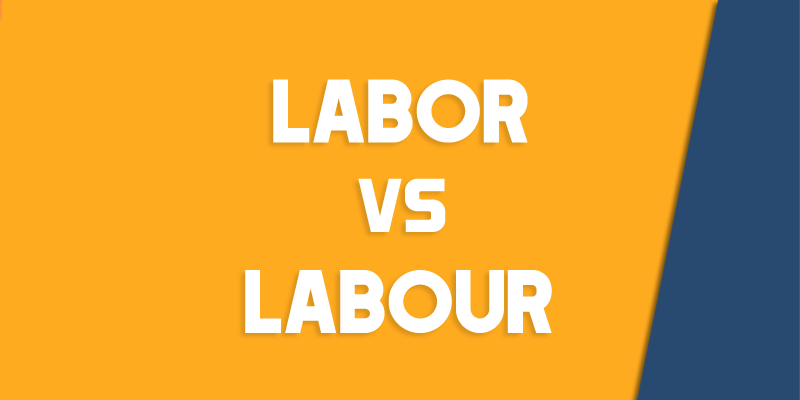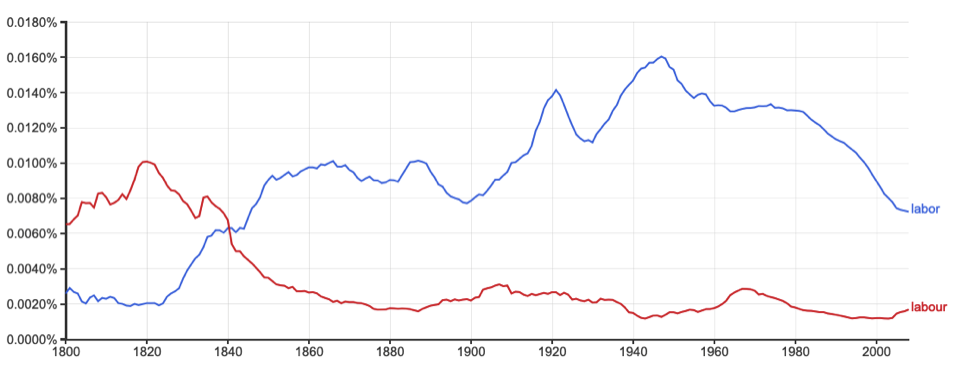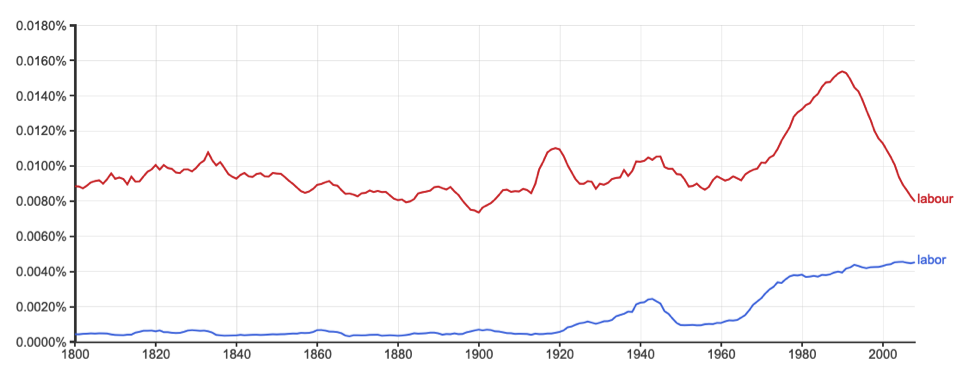Labor vs. Labour – What’s the Gist?
The words labor and labour are pronounced the same but spelled differently. However, this doesn’t mean that these terms are etymologically different words; rather they are dialectically different.

As nouns, they have the following meanings:
- The expenditure of physical or mental effort especially when that exertion is difficult or mandatory, or the skill set performed by workers that results in wages
- An economic group comprising those who do manual labor for hire
- An act or process requiring labor, or a product of labor
As an intransitive verb, they reflect the following denotations:
- To exert one’s powers of body or mind especially with painful effort
- To move with great effort
- To be in the process of childbirth
As a transitive verb, they have the following meanings:
- To treat or work out in protracted detail
- To cause to labor
As adjectives, they have the following denotations:
- Of or relating to labor
- If capitalized, indicating a political party that represents the interest of workers
However, don’t get the idea that these two words can be interchangeable in spite of sharing common definitions.
How to Use Labor in a Sentence
The reason these words are definitionally the same but spelled differently is because they reflect regional usage differences. Spelled without the letter u is the American version while inserting the u makes the British spelling. Therefore, you need to keep the audience in mind when choosing whichever spelling.
As mentioned, spelling labor by using the phonogram –or reflects the American English spelling. That means if your audience lives in the United States or its territories, use this version in your writing. The following graph will give you the visual changes in American English spelling popularity since 1800.

As you can see, if you graph both spellings of the word, the trend for American publications changes from the spelling of labour to labor after the year 1840. It seems the British influence continued some time into the 1800s even after the United States had become an independent nation.
However, once that change did switch over, the spelling of labor continued to expand and Americans never looked back.
This usage brings up an interesting question. In American publications, how should the British political party be spelled? Labor Party? Or Labour Party? As with any other proper noun, you should choose the spelling the person holding the name has given. In this case, no matter from which side of the pond you hail, spell Labour Party using the letter u.
How to Use Labour in a Sentence
The British use the phonogram –our to spell labour as well as other words with that use the –our suffix. Many Americans recognize the British flavour of this common UK suffix.
Keep this spelling of labour in mind should you find yourself writing for any of the countries that use British English as their language for publications. The following graph shows the spelling usage in books written in British books.

As you can see, spelling labour as such has been consistently and overwhelmingly the preferred choice. Interestingly, while the year 1990 reveals a sharp spike in the usage of labour in British publications, the graft also suggests a rising trend for the spelling of labor in the closing decades of the twentieth century.
What About Other Derivations of These Words?
The spelling distinction does carry over to other derivatives of the word labor/labour, including labored/laboured, laborious/labourious, and belabor/belabour.
Outside Examples of Labor vs. Labour
- Watch for whether more Americans came off the sidelines into the workforce. In January 4.8 million Americans who were out of the labor force jumped directly into jobs. More labor-force entrants are helping fuel job growth at a time of historically low unemployment. It is also one factor holding down wage growth, as workers coming from outside the labor force tend to command less pay than hires moving from other jobs. –The Wall Street Journal
- “(Monday) began with me hugging Bo and sprinting out of the office because my pregnant wife was going into early labor,” Torre wrote on Instagram along with a picture of his newborn daughter. –The New York Post
- The Telegraph can reveal that the shadow home secretary, who has called for an independent inquiry into Ms Patel, has been accused of shouting at and humiliating a former Labour staff member. –The Telegraph
- NHS guidelines say that women in labour can ask for epidurals at any time, including during the early stage of labour, and should be given information and support to choose what is right for them. –The Guardian
How to Remember These Words
To help you distinguish between the two versions of labor/labour, think of the letter u found in the British version of labour. This same letter is found in the word unique. The British English spelling of labour is a unique one.
Article Summary
Is labor or labour correct? While the meanings of these words are exactly the same, you need to remember how to spell these words based on the dialectical differences of your reading audience.
But you needn’t labor too hard over the differences.
- Labor without the letter u is used in American English.
- Labour with the letter u is used in British English.
